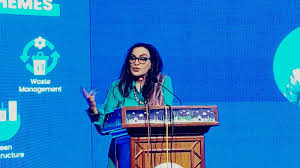“Connecting economies, building bridges: The BRI as a catalyst for global prosperity” – Senator Sherry Rehman’s Keynote on China’s Global Leadership

Liaquat Ali
Islamabad: Senator Sherry Rehman delivered a powerful keynote address at the International Conference titled “China at 75: A Journey of Progress, Transformation, and Global Leadership,” held to commemorate the 75th anniversary of the founding of the People’s Republic of China at the Pak-China Institute.
In her address, Senator Rehman hailed China’s remarkable journey of economic transformation, technological advancements, and its growing role as a global leader, particularly through visionary initiatives like the Belt and Road Initiative (BRI).
Highlighting China’s historic achievement in lifting more than 800 million people out of poverty, Senator Rehman pointed out that China’s poverty rate dropped from 88% in 1981 to less than 1% today, according to the World Bank—a feat unmatched in human history. “China’s model of long-term, strategic development is an example for the Global South. It is not just a story of economic growth, but of soft power and global leadership rooted in cooperation and shared prosperity. Soft power becomes smart power when it is translated into actionable, coordinated programs,” she remarked.
Senator Rehman highlighted the transformative power of the BRI, which since its launch in 2013, has connected over 140 countries through a vast network of infrastructure projects, with cumulative investments exceeding $1.3 trillion. “The BRI is more than just roads and railways; it is a catalyst for regional and global connectivity, one that has already increased trade by 45%,” she added.
Senator Rehman emphasized the deep and strategic ties between Pakistan and China, noting that the China-Pakistan Economic Corridor (CPEC) is one of the most ambitious undertakings within the BRI framework. “To date, CPEC has injected over $25 billion into Pakistan’s economy, primarily through energy and infrastructure projects, helping address our long-standing power shortages and creating new opportunities for growth,” she said. With total investments under CPEC amounting to $62 billion, Senator Rehman highlighted that CPEC has already increased Pakistan’s energy generation by nearly 30%, with over 2.3 million jobs expected by 2030. She added that the corridor is projected to add up to 2.5% to Pakistan’s GDP by 2030.
Senator Rehman also highlighted how CPEC is enhancing Pakistan’s regional connectivity. “Gwadar Port is set to become a major hub for trade between Central Asia, the Middle East, and Africa, offering new avenues for Pakistan’s exports and economic integration,” she noted.
In her keynote, Senator Rehman praised China’s commitment to sustainable development through the BRI’s focus on green infrastructure and renewable energy. “Over 60% of energy investments under the BRI are in renewables, and Pakistan is directly benefiting from projects like the Quaid-e-Azam Solar Park, which generates up to 1,000 megawatts of clean energy,” she said. Senator Rehman also mentioned the solarization of major government buildings in Pakistan and the importance of transitioning from “dirty, expensive fuel” to affordable and sustainable energy sources.
The Digital Silk Road, a key component of the BRI, is another area where Pakistan has seen substantial growth. Senator Rehman pointed out that Pakistan raised over $350 million in venture capital for tech startups in 2021, driven by the digital infrastructure improvements brought by CPEC. “The expansion of digital connectivity is opening new horizons for e-commerce, fintech, and digital services, helping us leapfrog into the future,” she said.
Senator Rehman also lauded China’s role in fostering cooperation across the Global South. “The BRI is redefining global connectivity, particularly for the Global South, providing new linkages, reducing transportation costs by as much as 30% in some regions like Africa, and offering a model of shared growth,” she said, referencing Ethiopia’s Addis Ababa-Djibouti Railway as a prime example of success in Africa.
She also emphasized the importance of sustaining momentum, stating, “This is more than just a stimulus package for infrastructure. The BRI is about building bridges—both literal and figurative—that link economies and people across borders. It is a framework for mutual gain, not zero-sum games.”
Concluding her remarks, Senator Rehman reiterated the strength of the China-Pakistan partnership, which she described as being cemented by “personal and institutional bonds, driven by goodwill and mutual cooperation.” She reminded the audience that the development of Gwadar Port, granted to China by President Asif Ali Zardari , was the spark that triggered CPEC, a project that is reshaping the future of both countries. Senator Rehman expressed hope for the continued growth of China-Pakistan relations under the BRI, urging for even deeper ties in areas like digital technology, green energy, and education. “The language of cooperation is not just spoken; it is learned. We are learning each other’s languages, building not just projects, but a shared destiny,” she concluded.





